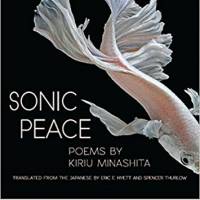“Sonic Peace,” which won the Chuya Nakahara Prize in 2006, is in the classic “artist-versus-modernity” vein. It rings with contemporary loneliness, solitary figures awake in the night and vending machines glowing in the gloom. Many of the voices are personified electronic devices, our phones and computers looking back at us from the “blue-darkness.” The threat of surveillance, of being watched, pervades the work, which is rooted in the artificiality of modern Tokyo. As the voice in “March Road” says, even the horizon is counterfeit.
Sonic Peace, by Kiriu Minashita, Translated by Spencer Thurlow and Eric Hyett.
116 pages
PHONEME MEDIA, Poetry.
The book is split into three phases, and each poem is presented first in Japanese, followed by the translation. Phase Two opens with "Coelacanth Weather," whose first stanza could stand for the whole collection: "In an alley in Akihabara / there's a shop where they sell / words made of plastic." We're in Akihabara, home of the weird, of the electronic, where the blending of vital and virtual is celebrated, where nature and spirituality are absent. We're down an alley, a tangent. Here, words are commodities to be traded — and what trade done in an alley is ever wholesome?
Language, for Minashita, is problematic. She is interested in naming, a process that demystifies the object or idea. The fascination for her lies in "what is lost in this conversion (from mystic to formal)." Language limits our imagination, trammels it in one direction. This paradox lies at the heart of "Sonic Peace": How do you write poetry about the modern world when your means of expression are compromised?


















With your current subscription plan you can comment on stories. However, before writing your first comment, please create a display name in the Profile section of your subscriber account page.